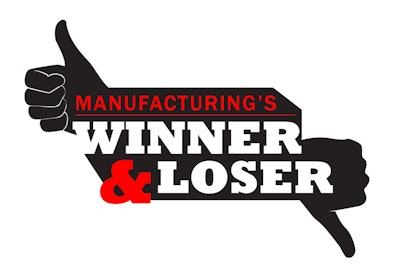
This week we have a winner who has made a major product breakthrough, while the loser has made a major publicity blunder.
Winner
This past week, the German company Sunfire presented their diesel fuel made from Carbon dioxide, water and electricity, as well as successfully tested the fuel in an Audi A8.
This new synthetic fuel has been dubbed Blue Crude and was first created in Sunfire’s factory in Dresden, Germany. In order to create Blue Crude, Sunfire starts with steam, where the hydrogen and oxygen are then split through a process cladded hydrolysis. Then carbon dioxide taken from the air is turned into carbon monoxide, which is then combined with the hydrogen to create hydrocarbons. The third step is the reversible electrolysis, which uses the Solid Oxide Power Core and is able to produce hydrogen with an efficiency of 90 percent.
“The steps themselves are not new, but the method has optimized the ability to produce fuel at an industrial scale through hydrolysis,” explains digital reporter Megan Crouse
According to the company, the new fuel will be more costly, retailing at approximately €1 and €1.50 per liter. However, those who use Blue Crude are promised greater efficiency as well as a more environmentally friendly fuel. “The engine runs quieter and fewer pollutants are being created,” says Sunfire CTO Christian von Olshausen.
Sunfire CEO Carl Berninghausen explains that unfortunately creating Blue Crude will always be more expensive than traditional fuel sources. “It’s like comparing a farmer who is growing grain on one farm, while his neighbor simply digs into a huge silo of grain he has discovered on his property. Who do you think will be able to offer the cheapest product?” says Berninghausen.
In spite of increased cost, Sunfire is optimistic and already has their first customer — Professor Dr. Johanna Wanka, the German Federal Minister of Education and Research. In fact, the Audi A8 in which the fuel was tested was her official car.
“The first critical question with any fuel is whether or not it’s compatible with the existing infrastructure,” says Berninghausen. “As a straight substitute for fossil fuels, Blue Crude certainly is."
Loser
Anheuser-Busch has not been having a good week of publicity. In an attempt to be “light-hearted” and in spirit with their Up for Whatever campaign, the company printed the following slogan on some of their beer:
"The perfect beer for removing 'no' from your vocabulary for the night #UpForWhatever"
However, the public did not respond even slightly well to the company’s new slogan. What followed can only be described as a public outcry on social media, claiming that the poorly chosen phrase perpetuates rape culture.
Not only is the slogan in poor taste, but it is particularly noticeable as the nation is currently experiencing a push, especially on college campuses, to understand and discourage sexual assault.
“What a fiasco,” says Edward Boches, a professor of advertising at Boston University. “It was beyond belief to me that a mainstream brand... could be so tuned out to cultural trends and important topical news issues. That they could not see the connection between saying ‘no’ and the ability to resist unwanted sexual advances.”
Alexander Lambrecht, the vice president of Bud light issued a statement about the bottles on Tuesday:
“The Bud Light Up for Whatever campaign, now in its second year, has inspired millions of consumers to engage with our brand in a positive and light-hearted way. In this spirit, we created more than 140 different scroll messages intended to encourage brand engagement. It’s clear that this particular message missed the mark, and we regret it. We would never condone disrespectful or irresponsible behavior. As a result, we have immediately ceased production of this message on all bottles.”
The bottles will not be recalled however. The company estimates that only 1 percent of the bottles in circulation have the slogan on them, and they do not pose a health risk, so it does not warrant a costly national recall.





















